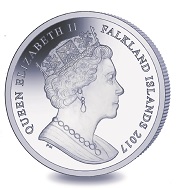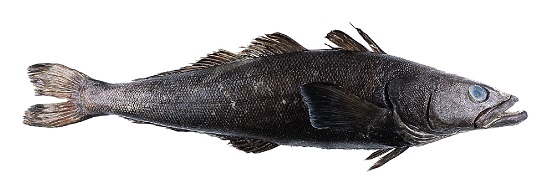September 7, 2017 – In recognition of 30 years of work conducted by Falkland Islands Fisheries Department (FIS) to help maintain fish populations around the Falkland Islands, Pobjoy Mint is releasing a new coloured titanium coin featuring the Patagonian Toothfish in an Eddy of Water.
Falklands / 1 Crown / Titanium / 10g / 36.1mm / Mintage: 2,000.
As Titanium reacts differently with every strike, each Patagonian Toothfish coin is technically different and varies slightly in colour. There is also a lined effect that is present on the coins which is unique to this metal. The obverse features the Pobjoy exclusive effigy design of HM Queen Elizabeth II in exceptional detail.
Specimen of the Patagonian Toothfish.
The Patagonian Toothfish (Dissostichus eleginoides) is a species of cod found in cold icy waters primarily in the southern Hemisphere at depths of between 45m and 3850m! Toothfish can grow to become very large and can weigh up to 100 kg and reach 2.3 m in length, although this is quite rare. It is estimated that they can live for up 50 years and sustain themselves by feeding on squid, small fish, prawns and crabs.
The Patagonian Toothfish is widely commercially fished however its name is deemed to be unattractive to consumers. In 1977 a U.S. fish wholesaler decided he wished to sell the species under a different name and chose to call it the ‘Chilean Sea Bass’ a name which is now recognised by FDA (Food & Drug Administration) for both the Patagonian Toothfish and a close relative, the Antarctic Toothfish.
Prince Charles has the Patagonian Toothfish firmly on his radar and begged a Labour minister Elliot Morley to make saving the fish a ‘high priority’ for the government in his letters, known as the black spider memos (due to his handwriting). The Prince’s concern stems from the overfishing and illegal fishing which may ultimately result in the decline of this unusual species.
The Falkland Islands are playing a role in the conservation of this species by creating regulated fisheries and collating data from Patagonian Toothfish catches. This was set up in 1994 with the increase in dermersal longliners targeting this species at depths of over 600m. The reports show that the fish stocks mainly decreased from 1994-1999 with the biomass currently at about 50% of what it was in its unexploited state. The official body responsible for the sustainable development of fisheries in the Falklands is the Falkland Islands Fisheries Department (FIS), established in 1987.
More information on this and other releases can be found on the Pobjoy Mint website.
The toothfish being at risk from illegal catches constitutes the subject of this BBC article.
And this is the homepage of the Falkland Islands Fisheries Department.







